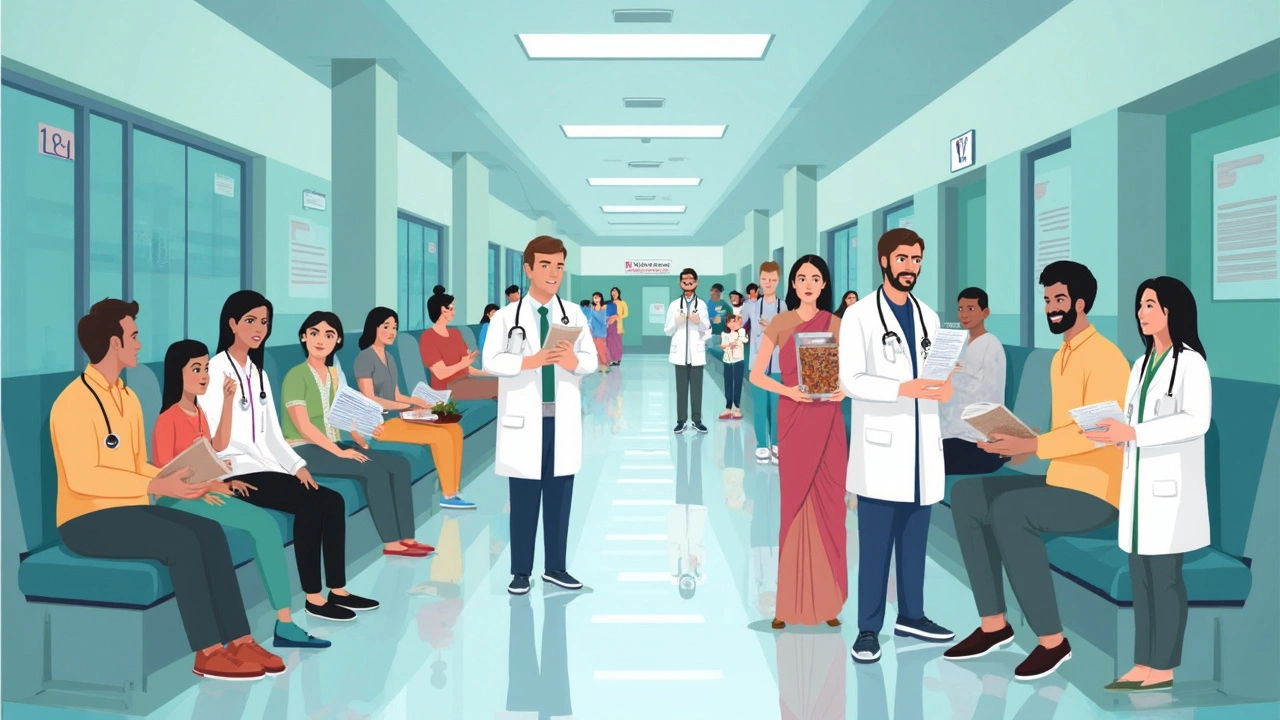
- Apr, 29 2025
- 0
Ever twisted your ankle or woken up with a nagging ache in your shoulder and wondered, “Do I need a bone doctor for this?” You’re not alone. Most folks don’t really know the difference between a regular doctor and a bone specialist, or what actually happens at an orthopedic hospital.
If you’re dealing with lingering pain, swelling, or had a fall that just doesn’t feel right, a quick visit to a general physician might seem fine. But sometimes, that’s just the start. For any pain that sticks around, trouble moving a joint, or weird sounds (like popping or grinding), it’s smart to look into seeing someone who really focuses on bones—an orthopedic doctor.
These specialists have training in everything from minor fractures to complicated joint surgeries. Not every injury needs an operation, though. In fact, some orthopedic doctors don’t even perform surgery, but they’re great at figuring out what’s wrong and helping you heal fast. Wondering how to pick the right one? There are real differences—some focus on sports injuries, others on arthritis, and some handle everything bone-related from head to toe.
So, before you book that appointment, let’s clear up exactly which doctor is best for bones and how to make sure you’re getting the care you need.
- Who Really Treats Bones?
- Types of Bone Doctors Explained
- When You Need an Orthopedic Surgeon
- Making the Right Choice for Fast Recovery
Who Really Treats Bones?
If you break a bone, have long-lasting joint pain, or just can’t shake off a twist or bruise, you’re probably wondering who’s the real expert. Most people think of an orthopedic doctor first. That’s spot on. Orthopedic doctors, sometimes called bone specialists or orthopedic surgeons, handle everything from tiny finger fractures to knee replacements.
But it’s not just orthopedic pros. Rheumatologists manage bone problems linked to immune system issues, like rheumatoid arthritis. Sometimes, you’ll also meet physical medicine and rehab doctors (physiatrists), especially for tricky, lingering pain after an accident or surgery. If you’re a kid, you might see a pediatric orthopedic doctor who knows growing bones inside out.
- Orthopedic surgeon: Fixes broken bones, does joint replacements, handles sports injuries.
- Rheumatologist: Treats bone pain caused by autoimmune conditions.
- Physiatrist: Focuses on rehab, recovery, and pain management for bones and joints.
- Pediatric orthopedic doctor: Specializes in bone problems in children and teenagers.
Surprisingly, it’s not just hospitals that handle bones. Many cities have specialized orthopedic hospitals or dedicated bone clinics where you get quick X-rays, targeted treatments, or therapy, all in one spot. According to a recent Indian Health Ministry report, over 60% of people with bone injuries now head straight to orthopedic clinics for faster, specialized care.
If you wake up with bone or joint pain that won’t quit, it’s smart to skip the guesswork and just look up an orthopedic doctor near you. No need to sit in pain or ignore a problem that may get worse.
Types of Bone Doctors Explained
When people talk about bone doctors, they're usually thinking of orthopedic doctors. But there isn’t just one kind. These doctors often have different specializations, so knowing who does what saves time (and money).
A bone specialist or orthopedic doctor mainly deals with injuries, pain, or diseases that affect your bones, joints, muscles, and sometimes nerves. Think broken arms, worn-out knees, or even back pain. But here’s the catch: not every bone doc is a surgeon.
- Orthopedic Surgeons: These are the folks who not only diagnose problems but can perform surgery if you need it. They handle things like fixing broken bones, replacing joints, or repairing torn ligaments. It’s a long road of training—most orthopedic surgeons spend around 13 years before they’re fully qualified.
- Non-Surgical Orthopedists: Not all bone issues need surgery. These doctors are big on physical therapy, pain meds, braces, and other treatments. If you don’t want anyone cutting you open right away, you might start here.
- Rheumatologists: Okay, they’re not orthopedic doctors, but they’re important. These specialists focus on arthritis and autoimmune bone diseases. If your pain comes from swelling or inflammation, this is your person.
- Pediatric Orthopedic Doctors: Kids with bone or joint problems need a different touch. These doctors handle everything from clubfoot to scoliosis, so your child’s growing bones are in good hands.
If you’re wondering when to go to whom, here’s a quick cheat sheet:
- Sudden accident with bone pain? See an orthopedic surgeon.
- Lingering joint or muscle pain without injury? Try a non-surgical orthopedist first.
- Swelling, weird rashes with pain, or early morning stiffness? Rheumatologist.
- Bone/joint issues in a child? Pediatric orthopedic doctor.
| Type of Doctor | What They Treat | Surgery? |
|---|---|---|
| Orthopedic Surgeon | Fractures, torn ligaments, severe joint issues | Yes |
| Non-Surgical Orthopedist | Muscle/joint pain, minor injuries | No |
| Rheumatologist | Arthritis, autoimmune diseases | No |
| Pediatric Orthopedic Doctor | Children’s bone/joint issues | Sometimes |
Don’t waste time figuring out where to start. For most bone or joint pain, an orthopedic doctor at a trusted bone hospital is a safe starting point—they’ll refer you to the right specialist if needed. This can mean faster relief and a smoother return to normal life.

When You Need an Orthopedic Surgeon
Not every bone issue needs an operation, but there are times when you need the expertise of an orthopedic surgeon. These are the doctors trained to fix broken bones, replace joints, repair torn ligaments, and more. Think of them as the big guns for serious injuries and tough cases.
You’ll want to see an orthopedic doctor or orthopedic surgeon if you have:
- Broken bones or fractures that won’t heal right with a cast
- Major joint problems, like a knee or hip that feels locked or slips out of place
- Ligament injuries that cause your knee or shoulder to buckle
- Repeated dislocations, especially in sports injuries
- Chronic pain in joints that keeps you from daily tasks despite other treatments
- Signs of infection in the bone or joint (redness, swelling, fever)
Here’s something most people don’t realize: Almost 7 out of 10 orthopedic surgeries in India are due to road traffic accidents or falls. Quick action after a major accident can mean the difference between a full recovery and long-term trouble.
| Reason for Surgery | Common Procedures |
|---|---|
| Fracture Repair | Bone plates, screws, or rods |
| Joint Damage | Knee or hip replacement |
| Sports Injuries | ACL (knee ligament) repair |
| Back Problems | Spine fusion/disc surgery |
If your doctor suggests surgery, don’t panic. Many people get back to normal life after a proper operation and rehab. A good bone specialist will walk you through why surgery is needed, what to expect, and how recovery works. Don’t hesitate to ask for a second opinion if you’re unsure.
One tip: If you can move (even a little) after an injury, but pain, swelling, or weird movement gets worse over days, it’s time to call a bone hospital or clinic. Ignoring bone damage only drags out healing and risks more problems.
Making the Right Choice for Fast Recovery
If you want to get back on your feet quickly, picking the right orthopedic doctor or bone specialist is half the battle. The wrong call can mean wasted time, discomfort, and in some cases, a longer recovery. So how do you make the best choice?
First off, look for a bone specialist who actually treats your specific problem. If it’s a sports injury, find someone with sports medicine experience. For joint pain, you’ll want a doctor who often handles arthritis or joint replacements. Credentials matter; check if your doctor is board-certified in orthopedic surgery or has extra training relevant to your case.
You’ll want a hospital or clinic with modern facilities—digital X-rays, MRI machines, and even in-house physical therapy. This cuts down on wait time, and lets your orthopedic doctor make quick, accurate calls. Good orthopedic hospitals usually have recovery teams of physiotherapists and pain specialists so you’re covered from diagnosis to rehab.
Here’s a simple checklist when picking your bone specialist:
- Are they experienced in treating your specific problem?
- Is the hospital well-rated and known for bone injury care?
- Does the clinic offer quick imaging and therapy services onsite?
- What do real patients say about their experience?
You can even check some public hospital ratings online. The National Accreditation Board for Hospitals (NABH) lists top orthopedic hospitals in India. According to a 2023 government report, over 70% of patients who visited accredited centers reported faster recovery times compared to non-specialty clinics.
| Facility Type | Avg. Recovery Time (Days) |
|---|---|
| Accredited Orthopedic Hospital | 25 |
| Non-specialty Clinic | 37 |
Don’t forget to ask questions. What’s the plan for recovery? Do you really need surgery, or can it be managed with therapy? A good orthopedic doctor will always walk you through options and help you avoid unnecessary treatments.
And here’s a tip for faster healing: stick to your rehab plan, do your home exercises, and eat protein-rich foods to support bone repair. Skipping follow-ups can set you back. The more you’re involved, the quicker you’ll bounce back.
Nikhil Verma
I'm a dedicated physician with a passion for exploring the intricacies of medicine, focusing on the unique healthcare challenges in India. I spend much of my spare time writing articles aimed at improving public understanding of health issues. Balancing my clinical practice and writing allows me to reach a wider audience, sharing insights and fostering a deeper appreciation for medical advancements. I derive immense satisfaction from both treating patients and engaging with readers through my writing.